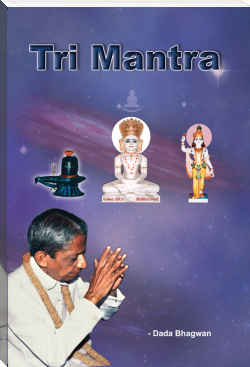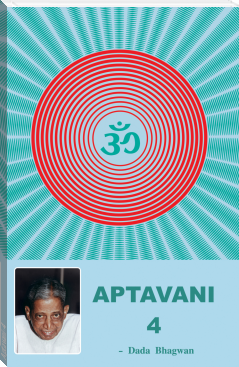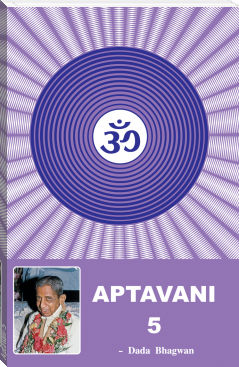Aptavani-2 - Dada Bhagwan (good ebook reader .TXT) 📗

- Author: Dada Bhagwan
Book online «Aptavani-2 - Dada Bhagwan (good ebook reader .TXT) 📗». Author Dada Bhagwan
Who can do pran-pratishtha i.e. instillation of ‘life’ in an idol? Only the Gnani Purush can do so.
q There are two paths to liberation. One is a Kramic path, which is a step-by-step path. The other is Akram; a step-less path. This step-less path is an exceptional path, it is a wonderful path!
It opens up once every million years! The same Akram path, which was given by Lord Rushabhdev to the Emperor Bharat, has been opened up by Dadashri and has become available to all who have the merit karma. Why Akram? The answer is, in order to attain the Self (the Soul), even the emperors gave up their kingdoms, wives and children and followed the sadguru to the forests. Even then, it was not certain that they would attain it. This is Akram. It is not such a painful path. The one who receives the grace of the Gnani Purush attains the Self in only one hour! After that, there is no need for any austerities, renunciation or acquisition. Such practices become redundant after attaining the Self. After Self-realization, the Gnani’s Agnas (spiritual instructions or directives) is one’s religion and the Gnani’s Agnas is one’s penance. Lord Mahavir has said, “Agna is religion. Agna is penance.” In the Akram path, there are only five Agnas and they are such that they cause no hindrance in the interactions of the worldly life, and on the contrary, they prove to be very helpful as a ‘master key’. With this master key, not a single ‘lock’ in the world can remain locked!
Although this seems incredulous, it is indeed, a fact; there are no two views about it. Thousands of people with merit karmas have attained the Self within one hour and have experienced it. It is the experience of many that after attaining Self-realization, the awareness as the Self, is not lost even for a moment. This is the only ‘cash bank of the divine solution’ in the world. In this bank, one can present any ‘check’ for cashing in but he should do so after complete understanding. Your check can be cashed all the way up to the final Moksha i.e. the ultimate liberation, lest you should become swooned by the mortal things of the world!
q Who can explain the science of prakruti (the non-self or the relative-self or the body-complex) completely? The one who has become ‘Purush’ , the pure Soul and is constantly the ‘seer’ of the non-self. Such a One can understand the science of ‘prakruti’ and explain it. How can those, who are immersed in the prakruti (in the relative-self) themselves; those who have not awakened as a Purush (the real Self), know or explain the prakruti? That can only be done by the Gnani Purush. There are infinite souls and infinite prakrutis and unless one becomes the Purush, he is constantly dancing to the tune of the prakruti, i.e. he is just a puppet on a string pulled by prakruti.
In the Kramic path, the prakruti becomes natural in a step-by-step process and then in the end the natural Soul i.e. the natural Self is attained. In the Akram path however, the Gnani Purush directly brings the soul in its natural form and after that, the prakruti (the relative-self) is to be brought in its natural state. How can the relative self become natural? The answer is, whenever the pending ‘files’ (pending karmic accounts) of the relative self are settled with equanimity, there is liberation, hence what remains in the end is the relative self in its natural form.
‘There is no decree forbidding one to attain moksha, only that he has to realize his own Self. Some may have an inclination towards renouncing, others may have a temperament for penance, yet others may be in the habit of enjoying sensual pleasures; whatever the case may be, in order to attain moksha, one only has to let the prakruti dissolve naturally.’
‘The body complex (the prakruti) is characterized by puran-galan the phenomenon of input-output, whereas the Self is not subject to input-output.’ - Dadashri
‘The Vitarag Lords always remained in a state of observing (seeing and knowing) their own prakruti. The prakruti dissolves when one remains as the ‘seer’ and the ‘knower.’
‘The sign of absolute knowledge (keval Gnan) is when one is in the state of continuously ‘seeing’ his own prakruti (relative-self)’. - Dadashri
What is the characteristic of prakruti, the non-self complex? Prakruti is like a child. If you want to get some work done by the prakruti, you can do so through persuasion, flattery, cajoling etc., just as you would with a child. It is easier to persuade a child thus, whereas, if you become an opponent of the prakruti, it will become uncontrollable. Therefore, somehow or other, even by enticing it with a ‘lollipop’, you can get your work done from it!
Many people refer to the Soul, the Self as nirguna (without attributes), but that is not correct. From the perspective of the attributes of the prakruti, the Soul is nirguna but from the perspective of the attributes of the Soul, the Soul has countless attributes.
‘Not a single attribute of the prakruti is in the pure Soul, and not a single attribute of the pure Soul is in the prakruti.’ - Dadashri
q ‘When the prakruti becomes natural and spontaneous, the Soul becomes natural and when the Soul becomes natural, the prakruti becomes natural.’ - Dadashri
The goddesses Ambama, Durgama, and all other Matajis (mother goddesses) represent divine energies of the non-self. All the divine Goddesses have laws. They grace those who follow their laws. Amba mataji symbolizes purity of prakruti. She graces and blesses the one whose prakruti is pure. What laws are to be observed to keep Goddess Saraswati, the goddess of knowledge, happy? It is to never use speech improperly. If one tells no lies, does not use fraudulent speech or abusive language in any manner whatsoever, then Goddess Saraswati will be pleased and as a result, one will attain extraordinary power of speech! The speech of the Gnani Purush is considered the manifestation of Goddess Saraswati, because it comes out after having ‘touched’ the Supreme Soul within!
What are the laws of Goddess Lakshmiji, the Goddess of wealth and prosperity? Her law is that one should not steal through his mind, body or speech; that is one foremost law of Goddess Lakshmiji. One should also not go chasing after Lakshmiji (money or wealth) nor should one obstruct her path. One should not have contempt for Lakshmiji either. The Gnani Purush will honor Lakshmiji with flowers when she comes before Him and He will honor her with flowers even when she leaves. Those who harbor a desire for wealth, Lakshmiji will ‘visit’ them later than sooner and she visits on time, those who do not harbor a desire for wealth.
How does one earn wealth? With labor and hard work?! With intellect (buddhi)?! No! A person earns wealth as a result of his past merit karma. Not having the knowledge or awareness of this hidden fact, people boast, “I earned my fortune. I earned it because of my intellect.” This is a wrong ego. Lakshmiji will come to you if your intent improves. True wealth, i.e. money that brings meaningful happiness when it is being spent, will never be earned if one has deceitful intents. What is more, only true wealth will give one peace in life. Wealth acquired through deceitful means will inevitably be lost and in the process, the pain it will entail will be like the pain from the bites of a thousand scorpions! The authority over whether one receives wealth or not is not in one’s own control; it is under the control of some other entity. Man only needs to do the work as a nimit (become instrumental in the process); he has to make all the attempts. One should not become disinterested in money (Lakshmiji) either and one should definitely not insult money (Lakshmiji). Anyone who insults Lakshmiji will be without Lakshmiji for many lives to come and all efforts he makes for Lakshmiji will be in vain.
q Gnani Purush ‘Dada Bhagwan’ gives a new spiritual aphorism to the world.
‘Dishonesty is the best foolishness’ - Dadashri
People have come to completely disregard old aphorisms like, ‘Honesty is the best policy.’
Those who want to attain moksha will have to follow the maxim of ‘no-law law’. Once one follows this maxim, he is said to have become natural and spontaneous. Wherever people try to gain control through enforcement of laws, people become resentful towards the law and their prakruti springs back with even a greater force and becomes uncontrollable, just liked a compressed spring!
“One day, this world will have to remove all laws! We are the first ones to start this ‘no law’ status. We will tell the government ‘look, at our management where there is a ‘no-law law’!” - Dadashri
Enforcing laws upon the mind spoils it and then its behavior becomes spoiled. Laws bring forth results related to restlessness and turmoil. The Self is natural and laws are the chain that makes one unnatural.
q What is true dharma dhyan (righteous or true meditation)?
Is it doing worship, prayer, penance, samayik (introspection), repentance and listening to religious talks? No. All those are overt and tangible acts of rituals; they are material practices. However, what is of importance and becomes recorded as one’s karma is where one’s dhyan i.e. one’s attention or inner intent lies while one is conducting such rituals. While worshipping God, if one pictures God in his mind along with the picture of his shop or his business or the shoes he left outside the temple, how can that be called true meditation (dharma dhyan)? The Lord does not take into consideration your external actions but rather your inner attentive intent during all your activities (kriya). The actions being carried out at present are the result of the meditation (dhyan) done in your past life. These actions are indicative of your independent efforts (purusharth ) in your previous life, whereas the present day meditation (inner dhyan) is the independent effort for the next life, in other words it is the ‘design’ for your next life!
Now, what is dharma dhyan? The effort you make to change the circumstances that create adverse meditation, is dharma dhyan. An integral part of dharma dhyan is sincere alochana, pratikraman and pratyakhyan (sincerely recalling and acknowledging the wrongful act, repenting for it and resolving never to repeat it, respectively; collectively referred to as doing pratikraman). This act of pratikraman however, cannot be carried out according to one’s own understanding; it should be done according to the Gnani’s teaching.
How does one change adverse internal meditations of arta dhyan and raudradhyan? It is to apply the knowledge that ‘these adverse internal meditations are happening because of my own karma of past life and no one is at fault here.’ On the contrary, one should repent by saying ‘Others have to endure pain because of me. I will never do it again’, one should make a firm decision





Comments (0)